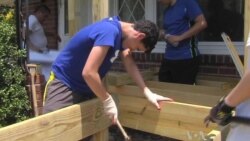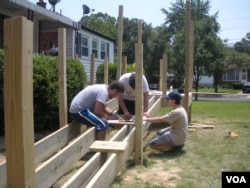NEW CARROLLTON, MARYLAND —
Under the sweltering sun in a Washington suburb, a group of teenagers saws wood, drills holes and puts together the beginnings of a wheelchair ramp.
The teens are volunteers in an annual summer program organized by a local non-profit called Yachad. The group’s main mission is to repair the homes of low-income Washington-area residents.
Yachad Program Director Kendra Rubinfeld says they created a program called Ramp it Up! “to allow all of these teenagers throughout the area to come together and channel their energy into a project that’s outside, that makes them sweat and work really hard, learn carpentry skills, work power tools and build an accessibility ramp onto the home of a low-income family who is living with a person with a disability that is in need of an access ramp.”
Valuable hands-on skills
Under the guidance of professional contractors, the young volunteers spend a week learning valuable hands-on skills and, as Rubinfeld points out, a whole lot more.
“It goes beyond all of these construction skills, and it really turns into more of an understanding of what it’s like to be disabled as much as somebody who’s able-bodied can understand it,” she said.
About halfway through their one-week project, the teens receive a day of what they call empathy training. They use wheelchairs and crutches to get a sense of the limitations facing people with disabilities.
Yachad partnered with American Jewish Society for Service (AJSS) and Jewish Social Service Agency (JSSA) to develop and implement a curriculum that would lend insight on what it is like to live with disabilities and the importance of social service.
“What it allows us to do is put more meaning behind what the kids are doing,” Rubinfeld said, “and we feel it’s important for us to include that in the curriculum.”
'Rewarding feeling'
At first, Alex Kramer, 18, felt like he’d much rather be laying on a couch in air conditioned comfort, “but after we finish the ramp, it’s just a rewarding feeling.”
Michael Greenberg, 17, finds volunteering for the ramp building project has been more rewarding than playing on an X-Box or PlayStation. “Although I do enjoy doing that, I think this is a good way to actually be hands-on.”
Dean Bregman, 17, has returned to volunteer with Yachad for the past three years.
“Right now I’m pretty exhausted,” he said. “It’s a lot of hard work, but in the end it’s very rewarding when you see the smile on the kid’s face when he comes down the ramp.”
End result
This year, that "kid" is Herson Portillo, 21, who has had cerebral palsy since birth.
Herson’s mother, Juana Hernandez, was overcome with emotion as Portillo was wheeled down his custom-built ramp for the very first time.
“I feel so happy to see the ramp that was finished. I don’t have the words to say [to] everyone. I don’t have the words to say how much... I mean I feel it,” Hernandez said. “Before, he has to climb steps, it was really hard for us because he’s getting bigger and heavier and when we were going up, it was dangerous for us. Now we are more safe.”
Herson’s father, Balmory Portillo, was grateful the ramp would now make life easier for everyone.
"I’m feeling happy,” he said tearfully. “Happy, very happy, so very happy…I never think something like that [was done] for my boy. It’s wonderful.”
Back for more
Witnessing such joy in a family has kept volunteer Ari Rickman coming back each summer.
“There’s a lot of charities, there’s a lot of problems in the world,” he said, “but it’s kind of rare to do something with your own two hands, and then actually see the difference that it makes.”
And that, says Rubinfeld, is what the program is really all about.
“I think they go into it thinking it’s going to be a normal summer program,” she said. “They come out of it saying, ‘I had so much independence on this project -- I really feel responsible for this thing that is changing someone’s life.’ And for that I think it’s a really special program.”
And for volunteers like Ari Rickman, it is an experience that may last a lifetime.
“I hope that when I grow up, I’ll either do something like this on the side, or I’ll have something as my career where I help people.”
The teens are volunteers in an annual summer program organized by a local non-profit called Yachad. The group’s main mission is to repair the homes of low-income Washington-area residents.
Yachad Program Director Kendra Rubinfeld says they created a program called Ramp it Up! “to allow all of these teenagers throughout the area to come together and channel their energy into a project that’s outside, that makes them sweat and work really hard, learn carpentry skills, work power tools and build an accessibility ramp onto the home of a low-income family who is living with a person with a disability that is in need of an access ramp.”
Valuable hands-on skills
Under the guidance of professional contractors, the young volunteers spend a week learning valuable hands-on skills and, as Rubinfeld points out, a whole lot more.
“It goes beyond all of these construction skills, and it really turns into more of an understanding of what it’s like to be disabled as much as somebody who’s able-bodied can understand it,” she said.
About halfway through their one-week project, the teens receive a day of what they call empathy training. They use wheelchairs and crutches to get a sense of the limitations facing people with disabilities.
Yachad partnered with American Jewish Society for Service (AJSS) and Jewish Social Service Agency (JSSA) to develop and implement a curriculum that would lend insight on what it is like to live with disabilities and the importance of social service.
“What it allows us to do is put more meaning behind what the kids are doing,” Rubinfeld said, “and we feel it’s important for us to include that in the curriculum.”
'Rewarding feeling'
At first, Alex Kramer, 18, felt like he’d much rather be laying on a couch in air conditioned comfort, “but after we finish the ramp, it’s just a rewarding feeling.”
Michael Greenberg, 17, finds volunteering for the ramp building project has been more rewarding than playing on an X-Box or PlayStation. “Although I do enjoy doing that, I think this is a good way to actually be hands-on.”
Dean Bregman, 17, has returned to volunteer with Yachad for the past three years.
“Right now I’m pretty exhausted,” he said. “It’s a lot of hard work, but in the end it’s very rewarding when you see the smile on the kid’s face when he comes down the ramp.”
End result
This year, that "kid" is Herson Portillo, 21, who has had cerebral palsy since birth.
Herson’s mother, Juana Hernandez, was overcome with emotion as Portillo was wheeled down his custom-built ramp for the very first time.
“I feel so happy to see the ramp that was finished. I don’t have the words to say [to] everyone. I don’t have the words to say how much... I mean I feel it,” Hernandez said. “Before, he has to climb steps, it was really hard for us because he’s getting bigger and heavier and when we were going up, it was dangerous for us. Now we are more safe.”
Herson’s father, Balmory Portillo, was grateful the ramp would now make life easier for everyone.
"I’m feeling happy,” he said tearfully. “Happy, very happy, so very happy…I never think something like that [was done] for my boy. It’s wonderful.”
Back for more
Witnessing such joy in a family has kept volunteer Ari Rickman coming back each summer.
“There’s a lot of charities, there’s a lot of problems in the world,” he said, “but it’s kind of rare to do something with your own two hands, and then actually see the difference that it makes.”
And that, says Rubinfeld, is what the program is really all about.
“I think they go into it thinking it’s going to be a normal summer program,” she said. “They come out of it saying, ‘I had so much independence on this project -- I really feel responsible for this thing that is changing someone’s life.’ And for that I think it’s a really special program.”
And for volunteers like Ari Rickman, it is an experience that may last a lifetime.
“I hope that when I grow up, I’ll either do something like this on the side, or I’ll have something as my career where I help people.”






